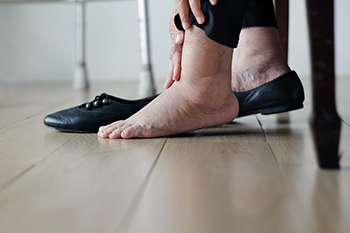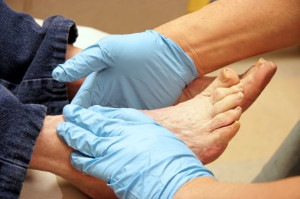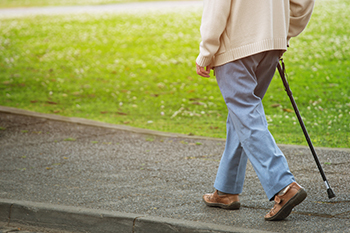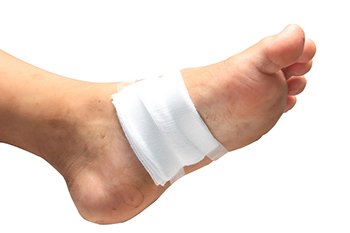Merrillville, IN
Munster, IN
February 2023
Medications May Cause Swollen Feet

Swollen feet are common among older people. They can happen as a result of poor circulation, low protein levels, or leaky blood vessels. Approximately 70 percent of seniors are affected by chronic venous insufficiency (CVI), and the affected veins rely on valves that keep the blood flowing backward. The valves may become less efficient as the aging process occurs, and the blood may remain in the veins longer than it should. Edema, or water retention, may happen as a result of this, and it can affect the feet and ankles. Heart failure may be another reason why the feet may become swollen. Prompt medical attention is often sought if this condition becomes chronic. There are certain medications that may worsen swollen feet. These can include beta blockers, hormonal medicines, and over-the-counter painkillers. If your feet are swollen, it is suggested that you consult with a podiatrist who can determine the cause and offer treatment methods that are correct for you.
Swollen feet can be a sign of an underlying condition. If you have any concerns, contact Ahmad Elsamad, DPM of The Institute of Foot & Ankle Reconstructive Surgery . Our doctor can provide the care you need to keep you pain-free and on your feet.
Swollen feet are a common ailment among pregnant women and people who stand or sit for extended periods. Aging may increase the possibility of swollen feet and patients who are obese often notice when their feet are swelling too. There may be medical reasons why swollen feet occur:
- Phlebitis - A condition that causes the veins to become inflamed and can also cause leg pain.
- Liver disease - This may lead to low blood levels of albumin which is a protein. This can cause fluid in the blood to pass into the tissues and several areas of the body can become swollen.
- Heart failure - When the heart doesn’t pump properly the blood that is normally pumped back to the heart can pool in the veins of the legs causing swollen feet.
- Kidney disease - One of the main functions of the kidneys is releasing excess fluid in the body. This type of condition can make it difficult for the kidneys to function properly, and as a result the feet may become swollen.
- Deep-vein thrombosis (DVT)- This is a serious condition where blood clots form in the veins of the legs. They can block the return of blood from the legs to the heart which may cause the feet to swell. It is important to be treated by a podiatrist if this condition is present.
Swollen feet can also be caused by bone and tendon conditions, including fractures, arthritis, and tendinitis. Additionally, there may be skin and toenail conditions and an infection may cause the feet to swell. Patients who take medicine to treat high blood pressure may be prone to getting swollen feet.
Many patients elevate their feet to help relieve the swelling and this is generally a temporary remedy. When a podiatrist is consulted the reason behind the swelling can be uncovered and subsequently treated.
If you have any questions please feel free to contact our offices located in Merrillville, and Munster, IN . We offer the newest diagnostic tools and technology to treat your foot and ankle needs.
Foot Health Tips for Diabetics

Since diabetes can cause side effects that negatively affect the feet, experts believe that a regular foot care routine can be helpful. One major foot problem experienced by diabetics is nerve damage. This can cause weakness, numbness, and pain in the feet and toes. In addition, nerve damage, or neuropathy, makes it difficult for the diabetic to feel sores, cuts, or blisters. The danger is that wounds that are slow to heal invite infection, which may quickly develop into skin ulcers on the feet. Here are some tips for diabetic foot care suggested by professionals. Above all, do a daily check of your feet, including the soles, for any cuts, sores, or other abnormalities. Avoid walking barefoot, as an open or undetected cut may be vulnerable to fungal or bacterial infection. Keep your feet clean and carefully dried, especially between the toes. Give up smoking, and keep toenails trimmed straight across. For more help with foot pain or other problems that can stem from diabetes, please consult a podiatrist regularly for checkups and treatment options.
Diabetic foot care is important in preventing foot ailments such as ulcers. If you are suffering from diabetes or have any other concerns about your feet, contact Ahmad Elsamad, DPM from The Institute of Foot & Ankle Reconstructive Surgery . Our doctor can provide the care you need to keep you pain-free and on your feet.
Diabetic Foot Care
Diabetes affects millions of people every year. The condition can damage blood vessels in many parts of the body, especially the feet. Because of this, taking care of your feet is essential if you have diabetes, and having a podiatrist help monitor your foot health is highly recommended.
The Importance of Caring for Your Feet
- Routinely inspect your feet for bruises or sores.
- Wear socks that fit your feet comfortably.
- Wear comfortable shoes that provide adequate support.
Patients with diabetes should have their doctor monitor their blood levels, as blood sugar levels play such a huge role in diabetic care. Monitoring these levels on a regular basis is highly advised.
It is always best to inform your healthcare professional of any concerns you may have regarding your feet, especially for diabetic patients. Early treatment and routine foot examinations are keys to maintaining proper health, especially because severe complications can arise if proper treatment is not applied.
If you have any questions please feel free to contact our offices located in Merrillville, and Munster, IN . We offer the newest diagnostic and treatment technologies for all your foot and ankle needs.
The Feet Can Be Hurt by Falling

Research has shown that more than 50 percent of elderly people who fall will endure life-threatening injuries if they are not found shortly after falling. There are various reasons why seniors may fall, including having arthritis, taking multiple medications, or lacking exercise. Additionally, having hypertension may cause the patient to feel light-headed, and this may interfere with balance. There are straightforward methods that can be implemented that may help reduce the risk of falling. Improving the lighting in the household and having regular physical and eye examinations are simple, yet effective practices for limiting falling episodes. Many people choose to have a grab bar installed in the shower and toilet area, in addition to removing worn rugs from the living area. Falling can seriously impact the feet, and it is not to be taken lightly. If you would like more information about effective fall prevention techniques, please consult with a podiatrist.
Preventing falls among the elderly is very important. If you are older and have fallen or fear that you are prone to falling, consult with Ahmad Elsamad, DPM from The Institute of Foot & Ankle Reconstructive Surgery . Our doctor will assess your condition and provide you with quality advice and care.
Every 11 seconds, an elderly American is being treated in an emergency room for a fall related injury. Falls are the leading cause of head and hip injuries for those 65 and older. Due to decreases in strength, balance, senses, and lack of awareness, elderly persons are very susceptible to falling. Thankfully, there are a number of things older persons can do to prevent falls.
How to Prevent Falls
Some effective methods that older persons can do to prevent falls include:
- Enrolling in strength and balance exercise program to increase balance and strength
- Periodically having your sight and hearing checked
- Discuss any medications you have with a doctor to see if it increases the risk of falling
- Clearing the house of falling hazards and installing devices like grab bars and railings
- Utilizing a walker or cane
- Wearing shoes that provide good support and cushioning
- Talking to family members about falling and increasing awareness
Falling can be a traumatic and embarrassing experience for elderly persons; this can make them less willing to leave the house, and less willing to talk to someone about their fears of falling. Doing such things, however, will increase the likelihood of tripping or losing one’s balance. Knowing the causes of falling and how to prevent them is the best way to mitigate the risk of serious injury.
If you have any questions, please feel free to contact our offices located in Merrillville, and Munster, IN . We offer the newest diagnostic and treatment technologies for all your foot care needs.
Foot Ulcers Can Be Serious

Peripheral neuropathy can cause a lack of feeling in the feet. One who has this condition may have serious changes in their bodies and foot ailments, like foot ulcers, that they are not aware of. A foot ulcer can come from things like cuts sustained from stepping on sharp objects or not tending to a blister from ill-fitting shoes. Causes of peripheral neuropathy can include having diabetes. Having uncontrolled high blood sugar levels can cause damage to blood vessels and lead to restriction of the blood supply to the feet. This, in turn, means the feet receive a lower number of infection-fighting cells and wounds can take longer to heal, sometimes even resulting in gangrene and the need for amputation. If you develop foot ulcers, and particularly if you are diabetic, it is highly suggested to be under the care of a podiatrist and receive immediate and ongoing treatment.
Wound care is an important part in dealing with diabetes. If you have diabetes and a foot wound or would like more information about wound care for diabetics, consult with Ahmad Elsamad, DPM from The Institute of Foot & Ankle Reconstructive Surgery . Our doctor will assess your condition and provide you with quality foot and ankle treatment.
What Is Wound Care?
Wound care is the practice of taking proper care of a wound. This can range from the smallest to the largest of wounds. While everyone can benefit from proper wound care, it is much more important for diabetics. Diabetics often suffer from poor blood circulation which causes wounds to heal much slower than they would in a non-diabetic.
What Is the Importance of Wound Care?
While it may not seem apparent with small ulcers on the foot, for diabetics, any size ulcer can become infected. Diabetics often also suffer from neuropathy, or nerve loss. This means they might not even feel when they have an ulcer on their foot. If the wound becomes severely infected, amputation may be necessary. Therefore, it is of the upmost importance to properly care for any and all foot wounds.
How to Care for Wounds
The best way to care for foot wounds is to prevent them. For diabetics, this means daily inspections of the feet for any signs of abnormalities or ulcers. It is also recommended to see a podiatrist several times a year for a foot inspection. If you do have an ulcer, run the wound under water to clear dirt from the wound; then apply antibiotic ointment to the wound and cover with a bandage. Bandages should be changed daily and keeping pressure off the wound is smart. It is advised to see a podiatrist, who can keep an eye on it.
If you have any questions, please feel free to contact our offices located in Merrillville, and Munster, IN . We offer the newest diagnostic and treatment technologies for all your foot care needs.








